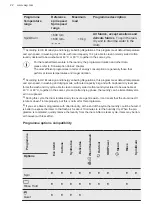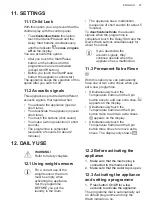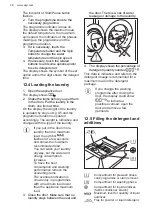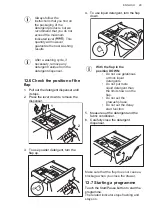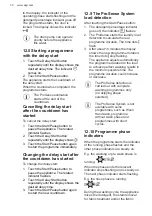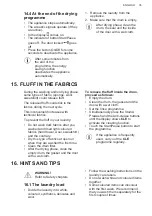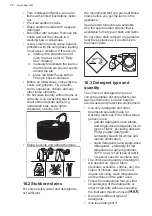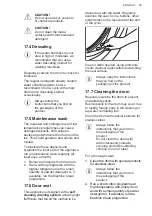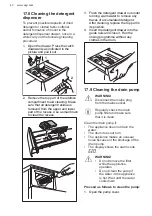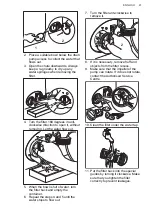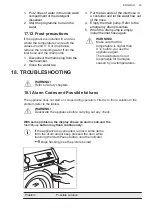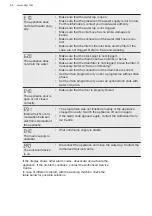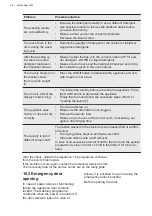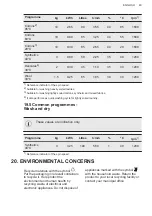
• Turn multilayered fabrics, wool and
items with printed illustrations inside
out.
• Pre-treat stubborn stains.
• Wash stubborn stains with a special
detergent.
• Be careful with curtains. Remove the
hooks and put the curtains in a
washing bag or pillowcase.
• A very small load can cause balance
problems with the spin phase leading
to excessive vibration. If this occurs:
a. interrupt the programme and
open the door (refer to "Daily
Use" chapter);
b. manually redistribute the load so
that the items are spaced evenly
around the tub;
c. press the Start/Pause button.
The spin phase continues.
• Button up pillowcases, close zippers,
hooks and poppers. Tie up belts,
cords, shoelaces, ribbons and any
other loose elements.
• Do not wash laundry without hems or
with cuts. Use a washing bag to wash
small and/or delicate items (e.g.
underwired bras, belts, tights,
shoelaces, ribbons, etc. ).
• Empty pockets and unfold the items.
16.2 Stubborn stains
For some stains, water and detergent is
not sufficient.
We recommend that you pre-treat these
stains before you put the items in the
appliance.
Special stain removers are available.
Use the special stain remover that is
applicable to the type of stain and fabric.
Do not spray stain remover on garments
near the appliance as it is corrosive to
the plastic parts.
16.3 Detergent type and
quantity
The choice of detergent and use of
correct quantities not only affects your
wash performance, but also helps to
avoid waste and protect the environment:
• Use only detergents and other
treatments specially made for
washing machines. First, follow these
generic rules:
– powder detergents (also tablets
and single-dose detergents) for all
types of fabric, excluding delicate.
Prefer powder detergents
containing bleach for whites and
laundry sanitization,
– liquid detergents (also single-dose
detergents) , preferably for low
temperature wash programmes
(60 °C max) for all types of fabric,
or special ones for woollens only.
• The choice and quantity of detergent
will depend on: type of fabric
(delicates, woollens, cottons, etc), the
colour of clothes, size of the load,
degree of soiling, wash temperature
and hardness of the water used.
• Follow the instructions that you find
on packaging of the detergents or
other treatments without exceeding
the indicated maximum level (
).
• Do not mix different types of
detergents.
• Use less detergent if:
www.aeg.com
36

